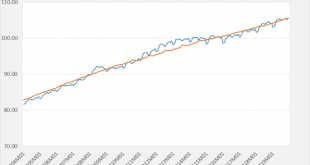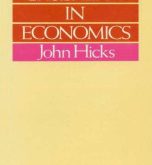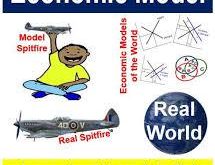The ECB rightly wants to pay more attention to costs of ‘owner occupied houses’ (OOH) when it comes to inflation. Statisticians often use ‘imputed rents’ to do this. The ECB shouldn’t do this but should look at actual costs of owners of houses. Rents and monetary costs of OOH do not develop in the same way. Also, rented houses are not inhabited by the same social and demographic groups as owner occupied houses. Which means that using rents to gauge the costs of OOH, as happens in many...
Read More »Hicks on the limited applicability of probability calculus
from Lars Syll When we cannot accept that the observations, along the time-series available to us, are independent, or cannot by some device be divided into groups that can be treated as independent, we get into much deeper water. For we have then, in strict logic, no more than one observation, all of the separate items having to be taken together. For the analysis of that the probability calculus is useless; it does not apply. We are left to use our judgement, making sense of what has...
Read More »Economics awaits a Darwinian revolution
from Blair Fix and RWER issue #90 Modern economics, I have come to believe, resembles pre-Darwinian biology. By this, I mean that economics is captivated by an ideology that is stopping scientific progress. Let’s look at the parallels. Before Darwin, biologists believed that life on Earth was created by God. This seductive idea stunted scientific progress for centuries. Much of the evidence for evolution – the fossil record, the similar anatomy of different species – was staring...
Read More »A policy-makers toolkit for state-backed digital currencies: do we need this?
from Maria Alejandra Madi Since the 2008 global financial crisis, the financial regulation scenario faces new drivers and challenges. Bank transactions by internet and mobile banking have sharply increased. In this digital environment, new technologies – such as advanced analytics, big data, in addition to the use of robotics, artificial intelligence, new forms of encryption and biometrics – have been enabling changes in the provision of financial products and services. The current wave...
Read More »The knowledge of childless philosophers
from Asad Zamzn Continuing from the previous post on The WHY of Crazy Models, I attribute a large portion of the blame to massively wrong theories of knowledge. A little bit of study of epistemology is enough to give anyone a headache. Because of this, instead of investing the time and effort to decipher what the philosophers are saying, the rest of us are willing to take it on faith. No one is aware of the massive amount of damage done by philosophers – most philosophers themselves are...
Read More »40 years of wage redistribution in the USA
Chicago economics — where do we unload the garbage?
from Lars Syll There is also a practical problem, if economics as a discipline is to survive. There is a huge amount of junk in the peer-reviewed economics literature -– the reviewing process is no protection when the reviewers themselves are prejudiced. A comparison that comes to mind is the collapse of “scientific” eugenics. There were vast amounts of that written, and now it is only read as an object example of the capture of a social science by prejudice and authoritarianism. For...
Read More »Human sociality and resource distribution
from Blair Fix and RWER issue #90 Is it obvious to you that humans are evolved social animals? Is it also obvious that our sociality is central to how we distribute resources? If you think so, you’re probably not an economist. Through years of schooling, mainstream economists are trained to ignore the obvious facts about human nature. The theories that economists learn make it impossible for them to understand human sociality. Economists are trained that humans are asocial “globules of...
Read More »Models and evidence in economics
from Lars Syll Analogue-economy models may picture Galilean thought experiments or they may describe credible worlds. In either case we have a problem in taking lessons from the model to the world. The problem is the venerable one of unrealistic assumptions, exacerbated in economics by the fact that the paucity of economic principles with serious empirical content makes it difficult to do without detailed structural assumptions. But the worry is not just that the assumptions are...
Read More »The WHY of crazy models
from Asad Zaman I was professionally trained as an economist, and learned how to build models with the best. As described in detail in a previous post on “The Education of An Economist“, it was only by accident that, a long time after graduate school, I learned of glaring conflicts between the theory I had been taught, and the historical evidence about effects of free trade and trade barriers. Further exploration along this direction dramatically widened the chasm between the economic...
Read More » Real-World Economics Review
Real-World Economics Review





